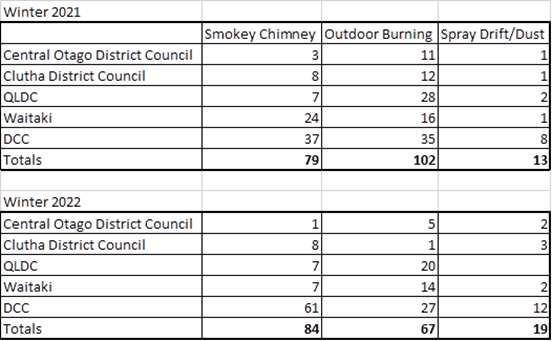Air quality data collected by the Otago Regional Council for the winter months May through to August reveal a lower number of high pollution days, while separate pollution data on complaints numbers declined 12.3%, to 170 incidents recorded in the winter just passed.
ORC’s Manager Compliance Tami Sargeant says the most common air complaints related to smoky chimneys and outdoor burning/fires.
The ORC Pollution Hotline recorded 170 air complaints between May and August this winter, compared with 194 complaints for the same time a year ago – a 12.3 % decline.
“Compliance action has included sending out educational letters to alleged offenders in relation to domestic chimney and outdoor burning complaints, as well as issuing one abatement notice and six infringement notices for alleged breaches of the Air Plan,” she says.
The abatement notice and one of the six infringements was in relation to air discharge consent non-compliance, while the other five infringements were related to outdoor burning/ fires, she says.
Ms Sargeant notes actual complaint numbers lodged with the ORC are much higher than incidents, given some incidents prompt multiple calls.
May-Aug 2021 and 2022 ORC Pollution Hotline air quality incidents recorded
Winter 2021
Smokey chimney |
Outdoor burning |
Spray/Drift/Dust |
|
| Central Otago District Council | 3 | 11 | 1 |
| Clutha District Council | 8 | 12 | 1 |
| Queenstown Lakes District Council | 7 | 28 | 2 |
| Waitaki | 24 | 16 | 1 |
| Dunedin City Council | 37 | 35 | 8 |
| Totals | 79 | 102 | 13 |
Winter 2022
Smokey chimney |
Outdoor burning |
Spray/Drift/Dust |
|
| Central Otago District Council | 1 | 5 | 2 |
| Clutha District Council | 8 | 1 | 3 |
| Queenstown Lakes District Council | 7 | 20 | |
| Waitaki | 7 | 14 | 2 |
| Dunedin City Council | 61 | 27 | 12 |
| Totals | 84 | 67 | 19 |

The number of high pollution days
ORC’s Air Quality Scientist Sarah Harrison has been looking at the number of high pollution days, where there were exceedances of the National Environmental Standards for Air Quality for particulate matter (PM10), emitted by solid-fuel burners for home heating.
“This [2022] winter had fewer exceedances than last year, but temperature trends over recent years have been warmer winters than average,” she says.
Air quality data for winter 2022 –May – August (24-hour average)




Ms Harrison cautions it is difficult to infer pollution trends winter-on-winter as the number of exceedances can vary depending on how harsh a winter is, and how often calm weather conditions occur, which allows pollution to accumulate.
Otago has several towns, including Alexandra, Arrowtown, Clyde, Cromwell and Milton where air quality is considered degraded during winter and the ORC is required to monitor and improve air quality where necessary.
Pre-winter, ORC again ran its annual, educational ‘Burn dry, breathe easy’ campaign, highlighting the environmental and health benefits of burning dry wood, advising on what materials to avoid, and providing cleaner burning tips.
Winter months May through to August 2022
Number of PM10 exceedances |
Winter 2022 |
Winter 2021 |
| Alexandra | 4 | 3 |
| Arrowtown | 10 | 23 |
| Central Dunedin | 0 | 1 |
| Cromwell | *n/a | 20 |
| Milton | *n/a | 13 |
| Mosgiel | 1 | 4 |
*Switching monitoring systems

Ms Harrison says the main pollutant of concern in Otago is particulate matter, a product of combustion, produced by emissions from solid fuel burners during winter.
PM10 is any solid or liquid particle with a diameter of less than 10 micrometres and PM2.5; particulate matter of less than 2.5 micrometres.
Short-term and long-term exposure to particulate matter can contribute to the risks of developing or exacerbating existing cardiovascular and respiratory conditions. Smaller particles such as PM2.5 are more dangerous because they can enter the bloodstream through the lungs.
“This makes the fine matter a serious threat to human health,” she says.
Switching monitoring to PM2.5
Ms Harrison says there is no PM10 data for Milton, Cromwell or Clyde this year, because ORC is switching monitoring to PM2.5.
“We’ve installed new instruments in Arrowtown, Clyde, Cromwell and Milton that monitor PM2.5 and are still conducting data analysis before we start sending data out to LAWA [Land, Air, Water Aotearoa],” she says.
“It is important we understand how the new instruments relate to the existing ones, so that we can provide accurate data, and ideally, be able to infer long term trends,” she says.
Ms Harrison says the switch to collecting PM2.5 data is a more direct way of measuring emissions from combustion sources.
Particulate matter from combustion sources is very fine, and falls into the PM2.5 category, whereas PM10 has other sources such as dust, pollen and sea salt.
The National Environmental Standards have proposed introducing a limit to PM2.5, so it is good to be collecting data in preparation for this, she says.
She notes that so far the new instruments recently installed are all working well and to specification.
Further information - Burn dry, breathe easy
Anyone seeing pollution around Otago should contact the 24/7 ORC Pollution Hotline on 0800 800 033, or email pollution@orc.govt.nz
